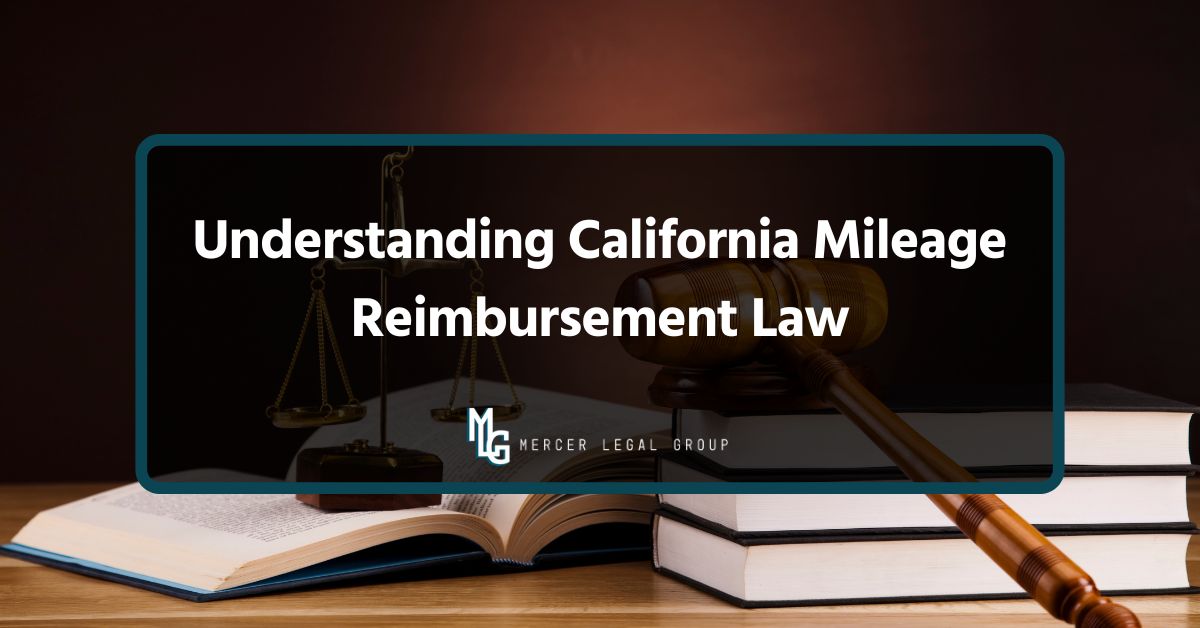The California Mileage Reimbursement Law requires employers to reimburse employees for all necessary expenses they incur while using their personal vehicles for work-related tasks. Although the state does not set a specific rate, most employers follow the IRS standard mileage rate to determine fair reimbursement. There are limited exceptions, but employers must ensure accurate reimbursement and cannot shift the financial burden of business travel expenses onto employees.
At Mercer Legal Group, our team of seasoned California employment attorneys brings years of expertise and experience in wage and reimbursement law, ensuring employees fully understand their rights under California Labor Code Section 2802. We rely on credible sources, including IRS mileage rate guidelines and state labor regulations, to provide accurate, up-to-date information you can trust. Our firm’s trusted reputation comes from successfully representing employees in reimbursement and wage disputes. Contact us today for a free consultation and let our legal professionals help you secure the fair compensation you deserve.
This blog will go over California’s mileage reimbursement law, including employee rights, employer responsibilities, and how to correctly calculate and claim reimbursement for work-related travel.
What Is the California Mileage Reimbursement Law?

The mileage reimbursement law in California requires employers to compensate workers for the business use of their personal vehicles, thereby relieving them of work-related expenses. Employers are required by California Labor Code Section 2802 to reimburse workers for all necessary incurred costs while carrying out their job responsibilities, including mileage traveled for business-related reasons like client meetings, deliveries, or errands.
In addition to fuel, California mileage reimbursement covers vehicle depreciation, parking fees, insurance, wear and tear, and maintenance related to business travel. This law’s main provisions place a strong emphasis on accurate recordkeeping and just compensation.
While California does not set a specific reimbursement rate, most employers follow the IRS standard mileage rate as a benchmark for compliance. Employees are encouraged to maintain detailed mileage logs or receipts, and employers are responsible for ensuring full reimbursement for legitimate business travel expenses. Failure to comply can expose employers to penalties, back pay claims, and legal disputes, making adherence to the law essential for maintaining fairness and compliance in the workplace.
Legal Framework
The legal framework is primarily based on California Labor Code Section 2802, which requires employers to provide expense reimbursement for all reasonable costs employees incur while performing job duties. This includes vehicle expenses incurred when using a personal vehicle for business travel, excluding normal commuting.
The California Supreme Court upholds this obligation. It reinforces employers’ commitment to fully reimburse employees for necessary business expenses in accordance with both state and federal guidelines. Failure to comply can result in wage claims or enforcement actions through the Division of Labor Standards Enforcement (DLSE) or lawsuits for unpaid personal vehicle expenses.
The current mileage reimbursement rate in California typically aligns with the IRS standard mileage rate, which serves as a federal benchmark for calculating fair compensation. As of 2025, the IRS rate is 67 cents per mile. However, employers may choose to reimburse at a different rate if it more accurately reflects the employee’s actual vehicle-related costs, such as gas, insurance, and maintenance.
Ultimately, the goal of the law, supported by state courts and labor authorities, is to ensure employees are not financially burdened for using their personal vehicles for business purposes, promoting fair and lawful expense reimbursement practices across California workplaces.
What Are the Mileage Reimbursement Methods?
Employers in California can choose from several methods of mileage reimbursement in California, each designed to fairly compensate employees for business-related vehicle use. The most common is the standard mileage rate, which follows the IRS-approved rate of 67 cents per mile in 2024. This rate covers typical vehicle costs like gas, maintenance, and insurance.
The standard mileage rate method is easy to calculate and is commonly used, which is why many employers prefer it for consistent and compliant reimbursements. Alternatively, employers may use the actual costs method, which reimburses employees for documented expenses directly tied to business use, such as fuel receipts, repair bills, and insurance.
Some employers also opt for the lump sum method (also known as car allowances), providing a fixed payment to cover expected travel expenses. However, if the lump-sum payment fails to fully cover the employee’s actual costs, California law mandates the employer to cover the shortfall, ensuring that employees do not incur any out-of-pocket expenses for necessary business travel.
How Do You Calculate Mileage Reimbursement in California?

Calculating mileage reimbursement in California starts with determining the total miles an employee drives for business purposes, excluding normal commuting. Employers typically multiply the number of business miles by the IRS standard mileage rate, which reflects average vehicle expenses like fuel, maintenance, and insurance. For 2025, the IRS rate is 67 cents per mile, serving as the standard benchmark for most California employers.
Alternatively, employers can use the actual expense method, reimbursing employees based on documented costs directly related to business use. This includes receipts for fuel, repairs, insurance, and depreciation, proportionally allocated to work-related travel. Regardless of the method used, California Labor Code Section 2802 requires employers to ensure that reimbursement fully covers employees’ out-of-pocket costs for business-related travel expenses.
What Are the Current Reimbursement Rates?
In 2023, the IRS set the standard mileage reimbursement rate for business use at 65.5 cents per mile. In 2024, the California mileage rate was adjusted upward to 67 cents per mile to accommodate rising vehicle and fuel costs.
These rates are derived from an annual study conducted by the IRS to estimate the fixed and variable costs of automobile ownership (like depreciation, insurance, maintenance, fuel, and repairs). Each year, the IRS reviews cost trends and issues a notice or revenue procedure with updated per-mile rates. The rates must be revisited annually because vehicle operating expenses fluctuate, so the IRS uses the latest data to reflect changes in fuel prices, parts, and other cost factors.
Calculation Methodology
To calculate mileage reimbursement in California, start by collecting the necessary data. This includes the total number of business miles driven, which can be verified through accurate logs or digital tracking. Employers must exclude personal or commuting miles and focus solely on travel directly related to work duties. This ensures compliance with California Labor Code Section 2802, which requires full reimbursement for necessary business expenses.
The step-by-step process is simple: multiply the total number of eligible business miles by the applicable reimbursement rate, typically the IRS standard mileage rate (67 cents per mile for 2024). For example, if an employee drives 200 business miles, the reimbursement would be 200 × $0.67 = $134. Employers may also choose the actual expense method, using receipts to calculate the exact costs of fuel, maintenance, and depreciation.
Common pitfalls include mixing personal and business mileage, failing to keep detailed records, or using outdated reimbursement rates. Employers should regularly review IRS updates, audit mileage logs, and maintain transparent policies to ensure accurate, lawful, and fair reimbursements for all business-related travel.
What Are the Documentation Requirements of California’s Mileage Reimbursement?
To comply with California’s mileage reimbursement requirements, employees must maintain detailed and accurate documentation of their business travel. The most common method is a mileage log that records the date, destination, purpose of the trip, starting and ending odometer readings, and total miles driven for each business-related journey. This log can be kept manually or with the help of digital tracking apps, as long as it provides verifiable and consistent data.
Employers, in turn, should retain these records and any related receipts or expense reports to demonstrate compliance with California Labor Code Section 2802. Proper documentation not only ensures that employees are fully reimbursed for legitimate expenses but also protects both parties in the event of an audit or dispute. Accurate records help verify that all reimbursed mileage was strictly for business use, supporting transparency and legal compliance.
Required Information
For mileage reimbursement claims in California, employees must maintain detailed trip records that clearly document all necessary expenditures related to business travel. Each entry should include the date, starting point, destination, and total miles driven to verify that the travel was required for work purposes and supports accurate reimbursement calculations. These records ensure that employers reimburse employees fairly for the actual expenses incurred while performing job duties.
In addition to mileage data, employees should note the purpose of each trip, such as client meetings, deliveries, or off-site assignments, and keep a consistent mileage log, either manually or digitally. Maintaining organized and accurate records helps ensure compliance with California Labor Code Section 2802, demonstrating that all necessary expenditures are properly documented and reimbursed, while preventing disputes between employees and employers.
What Are Compliance Best Practices for California Mileage Reimbursement?

To maintain compliance with California’s mileage reimbursement laws, employers should implement consistent recordkeeping practices. Using digital mileage tracking tools can streamline the process, automatically logging trip details such as distance, date, and purpose. However, paper logs remain acceptable as long as they are accurate and updated regularly. The key is ensuring all mileage records clearly reflect business-related travel and exclude personal or commuting miles.
Employers can further strengthen compliance by conducting regular audits of mileage claims to identify errors or inconsistencies. Additionally, employee training is essential; workers should understand what qualifies as reimbursable mileage, how to record trips properly, and when to submit claims. Clear policies, combined with routine oversight, help protect both employers and employees from disputes or violations under California Labor Code Section 2802.
Can Employers Refuse Mileage Reimbursement?
Since employers are legally required to reimburse employees for necessary expenses incurred while performing their job duties, they generally cannot refuse mileage reimbursement if the travel was required for work purposes. Denial of reimbursement may expose the employer to legal action or penalties for violating labor laws, as employees have the right to recover unpaid expenses.
However, there are limited circumstances where an employer might justifiably deny reimbursement. For instance, if the mileage claimed includes personal or commuting miles rather than business-related travel, or if the employee fails to provide accurate documentation or proof of mileage, the employer can reject the claim. Clear communication and proper recordkeeping, such as maintaining a mileage log, help prevent disputes and ensure compliance with California’s reimbursement requirements.
Legal Exceptions
While California law requires employers to reimburse employees for business-related mileage, there are specific exceptions to this obligation. The most common exception involves commuting miles; the distance an employee travels between home and their regular workplace is considered personal and not reimbursable.
Similarly, if an employee chooses to take voluntary travel that isn’t required or directly related to their job duties, the employer pays only for the exact expenses tied to legitimate business purposes, not personal trips. Another exception arises from contract stipulations or written agreements that define reimbursement policies. For instance, if an employment contract or collective bargaining agreement specifies that certain types of travel are excluded from reimbursement, those terms generally govern, provided they comply with California labor laws.
Employers must still ensure that any reimbursement policy does not unfairly transfer necessary business costs onto employees. Failure to do so can lead to improper employee compensation practices and a violation of California Labor Code Section 2802.
Dispute Resolution

If an employee’s mileage reimbursement claim is denied, the first step is to address the issue internally by reviewing company policies and discussing the matter with a supervisor or HR department. Employees should provide supporting documentation, such as mileage logs or receipts, to clarify any discrepancies.
If the issue remains unresolved after exhausting internal methods, the employee can file a complaint with the California Labor Commissioner’s Office, which investigates violations of Labor Code Section 2802 and can order employers to pay owed reimbursements for losses incurred as a direct consequence of performing work duties.
For more serious or ongoing disputes, employees have additional legal recourse, including filing a civil lawsuit to recover unpaid expenses and potential damages. In some cases, mediation or arbitration may also be used to reach a fair settlement outside of court.
Since the Internal Revenue Service (IRS) guidelines often influence mileage calculations and reimbursement standards, understanding these rules can strengthen an employee’s case. Seeking guidance from an experienced employment attorney can help employees interpret these regulations, gather evidence, and pursue fair compensation effectively.
Ready to Pursue Mileage Reimbursement?
If you’ve been using your personal vehicle for work-related travel without proper reimbursement, you have the right to take action under California’s mileage reimbursement law. This law protects employees from bearing business expenses that should rightfully be covered by their employers. By understanding your rights and pursuing reimbursement, you can hold employers accountable and ensure you’re fairly compensated for every mile driven in the course of your job.
Don’t let unpaid expenses go unresolved. Protect your rights and seek justice through the proper legal channels. Whether it’s filing a complaint or exploring legal remedies, taking action can help you recover what you’re owed. For personalized guidance and strong representation, consult an experienced California employment attorney. They can help you navigate the process and fight for the compensation you deserve.
Are you unsure whether your employer is properly reimbursing you for business-related travel in California? At Mercer Legal Group, our experienced employment attorneys specialize in wage and reimbursement law, helping employees understand and enforce their rights under California Labor Code Section 2802. We provide dependable legal advice based on expertise, experience, and trustworthiness, aided by credible sources such as IRS mileage rate updates and California labor regulations. Contact us today for a free consultation and let our dedicated team help you recover the full compensation you’re entitled to.
Frequently Asked Questions
Understanding California’s mileage reimbursement law is essential for both employees and employers to ensure fair compensation for work-related travel. Below are answers to common questions about mileage rates, legal requirements, and how to properly calculate reimbursement in California.
What Is the Current Mileage Reimbursement Rate in California?
In California, as of January 1, 2025, the standard mileage reimbursement rate for business use is $0.70 per mile.
How Do I Calculate Mileage Reimbursement for My Work in California?
To calculate mileage reimbursement for work in California, multiply the total miles driven for business purposes by the current reimbursement rate of $0.70 per mile. For example, if you drove 200 business miles, your reimbursement would be 200 × $0.70 = $140.
Are Employers in California Required by Law to Reimburse Employees for Mileage?
Yes, employers in California are legally required under Labor Code Section 2802 to reimburse employees for necessary business expenses, including mileage for work-related travel. This ensures employees are not forced to bear the cost of using their personal vehicles for their employer’s benefit.




